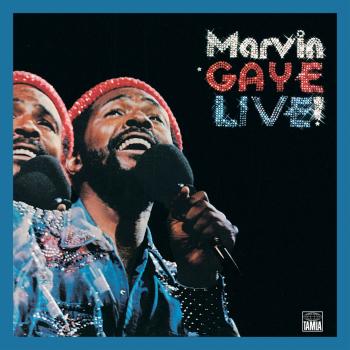
M.P.G. (Remastered) Marvin Gaye
Album info
Album-Release:
1969
HRA-Release:
08.10.2021
Album including Album cover
I`m sorry!
Dear HIGHRESAUDIO Visitor,
due to territorial constraints and also different releases dates in each country you currently can`t purchase this album. We are updating our release dates twice a week. So, please feel free to check from time-to-time, if the album is available for your country.
We suggest, that you bookmark the album and use our Short List function.
Thank you for your understanding and patience.
Yours sincerely, HIGHRESAUDIO
- 1 Too Busy Thinking About My Baby (Single Version / Mono) 02:56
- 2 This Magic Moment 02:40
- 3 That's The Way Love Is (Stereo Version) 03:45
- 4 The End Of Our Road 02:45
- 5 Seek And You Shall Find 03:38
- 6 Memories 02:45
- 7 Only A Lonely Man Would Know 03:00
- 8 It's A Bitter Pill To Swallow 03:11
- 9 More Than A Heart Can Stand 02:56
- 10 Try My True Love 02:56
- 11 I Got To Get To California 02:51
- 12 It Don't Take Much To Keep Me 02:40
Info for M.P.G. (Remastered)
M.P.G. is the ninth studio album by American soul musician Marvin Gaye, released in 1969 for the Tamla label. His best-selling album of the 1960s, it became Gaye's first solo album to reach the Top 40 on the Billboard Pop Albums chart, peaking at No. 33, and also became his first No. 1 album on the Soul Albums Chart.
Great late 60s work from Marvin Gaye – a pre-What's Going On set that still shows him picking up some of the hipper, deeper themes bubbling under at Motown – a bit of the heavier bass and politics of Norman Whitfield camp, touched with some of the sweeter soul from earlier years! The mix is really great, and makes the record a key transitional one in Gaye's years at Motown – a great hint of the deeper styles to come, and proof that even in these earlier years, Marvin was still capable of sounding plenty righteous!
Marvin Gaye, vocals
The Andantes, background vocals
The Funk Brothers
Produced by Norman Whitfield, Brian Holland, Lamont Dozier
Digitally remastered
Marvin Gaye
Brilliant, enigmatic, and headstrong, Marvin Gaye was an innovator. In 2009, he would have been 70 years old, and it has been 25 years since his tragic death. But today Marvin remains as influential and exciting as ever: Rolling Stone recently named him one of the greatest singers of all time.
He was born Marvin Pentz Gay Jr. on April 2, 1939, in Washington, D.C., where he dreamed of singing before large crowds; he joined a co-founded a local doo-wop group, the Marquees, who were spotted by Harvey Fuqua, who made them his new Moonglows. Marvin arrived in Detroit on tour with the Moonglows and stayed, as did Harvey, and Marvin was signed to Motown just based on raw singing talent. He was also a songwriter, an OK drummer-and handsome as hell. He wanted to sing jazz, to croon Tin Pan Alley standards, but that didn’t pan out. Motown founder Berry Gordy encouraged Marvin to sing R&B, and once Gaye sang the soulful (and autobiographical) “Stubborn Kind Of Fellow” in 1962, stardom enveloped him. The incendiary “Hitch Hike,” “Pride And Joy,” and “Can I Get A Witness” sold like crazy in 1963, and Marvin oozed silky sexiness on the 1965 classics “How Sweet It Is (To Be Loved By You),” “I’ll Be Doggone” and “Ain’t That Peculiar.”
By 1968′s immortal “I Heard It Through The Grapevine,” and on a series of electrifying duets with Mary Wells, Kim Weston (“It Takes Two”), and his ultimate singing partner, the ravishing but ill-fated Tammi Terrell (“Ain’t No Mountain High Enough,” et al), Gaye was a commercial force. He soon became recognized as an artistic one as well.
At decade’s turn, Marvin seized full control of his output with the deeply personal, socially aware 1971 masterpiece What’s Going On, which produced three hit singles: the title track, “Inner City Blues (Make Me Wanna Holler)” and “Mercy Mercy Me (The Ecology).” He defied expectations again with “Trouble Man,” a 1972 hit single featured in his haunting, jazzy score of the movie of the same name. He zoomed to the top of the charts with his passionate Let’s Get It On, while delivering a pop confection in Diana and Marvin, his duet album with Motown’s queen, Diana Ross. I Want You, released in 1976, was another sensual masterwork, a meditation on obsessive love that was also No. 1. Marvin made his personal life public through his songs, and it was never more evident in 1978′s Here, My Dear, a sprawling double-album chronicling his divorce from Anna Gordy, Berry’s sister. Even his No. 1 dance classic from 1977, “Got To Give It Up,” a studio cut added to flesh out the double-LP Live At The London Palladium, was about the singer’s reluctance to get loose on the dance floor.
Marvin left Motown in 1981, with the politically tinged album In Our Lifetime. He fled to London, then Belgium, where he created for Columbia Records “Sexual Healing,” his first Grammy® winner. But another hit was not salvation from his demons. On April 1, 1984, one day before his 45th birthday, Marvin was shot to death by his father.
Marvin’s influence reaches across the generations. He was rightfully among only the second group of artists honored with induction into the Rock and Roll Hall of Fame, in 1987. More recently, Marvin was No. 6 on Rolling Stone’s list of the 100 Greatest Singers Of All Time. “Motown Week” on American Idol 2009 (Season 8) featured remaining contestants singing not one but two of Marvin’s songs. His records-and his ringtones and his DVDs-are still going gold.
This album contains no booklet.
























